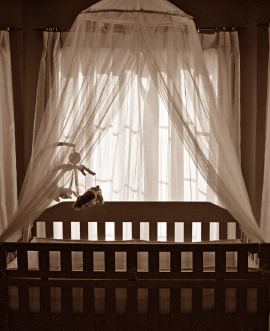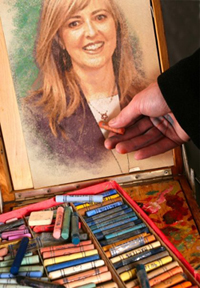Grief: the gift that keeps on giving
 Sunday, April 18, 2010 at 9:44PM
Sunday, April 18, 2010 at 9:44PM  This blog entry is about one of the hardest things I’ve ever had to face (besides cancer and divorce). I’ve never written about it before and I’ve rarely talked about it, even with my own family. It’s only now, nearly 20 years later, that I’m reckoning with the emotional distress that infertility has caused in my life and marriage.
This blog entry is about one of the hardest things I’ve ever had to face (besides cancer and divorce). I’ve never written about it before and I’ve rarely talked about it, even with my own family. It’s only now, nearly 20 years later, that I’m reckoning with the emotional distress that infertility has caused in my life and marriage.
My feelings are pretty raw right now. A seemingly innocuous conversation today brought out all the unresolved hurt, anger, and pain that I’ve squelched all these years. I’m tired of comments that seem to marginalize our family because we have “only one child.” I’m tired of not admitting how much it has hurt over the years. I’m tired of feeling that we’re somehow not a “real family,” or worse, we’re somehow to be pitied because our family get-togethers are smaller than normal. Am I feeling sorry for myself? You could say that.
I need to write about this so I can bring it out into the light and get some healing. I want people who have never experienced infertility to think twice before making an insensitive remark. I want people to know that even if a couple has one child, they may want more and may not be able to have them. Don’t judge people from the outside—you don’t know their stories. And if you haven’t had children yet, don’t just assume that you’ll have as many as you want with no difficulty. You don’t know what kind of curve balls life is going to throw your way.
I’m not asking for pity, just compassion. Yes, my husband and I have a child. She is more than I ever dreamed a child of mine could be. I’ve often felt that she makes up for any number of children that we could have had. Yet, if I’m honest with myself and with you, my reader, I will admit that the grief caused by having the dream of bigger family taken away was (and sometimes still is), devastating.
Unfortunately, my husband and I waited until we were married nearly nine years before we even tried to have a child. When our daughter was born, I was 33 years old. The first thing we said to each other the day after her birth was, “Why did we wait so long to have a baby?” I don’t know why—I don’t ever remember it being a completely conscious decision—we just selfishly put other things first and by the time she was born, we were in the middle of a financial crisis and a failed business. Her birth was the one bright spot in an otherwise dismal time in our lives.
We always believed that children were a gift from God, but we realized too late that we were wrong to have put off having them. We wanted more—a bigger family. We didn’t know how much time we had left to have more children, but we planned at least another child a year or so after our daughter’s birth. But it was not to be.
It had only taken a few months to get pregnant the first time. When nothing happened after several months of trying for a second child, I felt instinctively that something was wrong. So we visited a specialist at Virginia Mason Hospital in Seattle (twice). The verdict: secondary infertility. For some reason (we can only speculate on the cause), we were no longer able to have children. We never knew for sure whether our daughter’s birth was a gigantic (wonderful) fluke or whether something went wrong after her birth, although we have reason to believe the latter.
We were devastated. And of course, as usually happens with these kind of things, each one of us dealt with it in a different way. My way of dealing with it was to go into research mode, trying to find an answer to why we were infertile and some way to have another child. My husband withdrew into his own world of hurt. When we tried to talk about it, our conversations usually ended in recriminations of the "shoulda-woulda-coulda" variety. It became too much of an emotional minefield, so we mostly avoided the subject. The few friends who knew about our predicament at the time said things like, “Oh, I’m sure you’ll have another one, just give it some time.” The pain was real and acute.
One day, as I waited for my daughter’s dance class to finish, a mother who had just given birth to her second child commented to the other women, “I think people who have only one child are selfish.” I could feel my cheeks burning and a lump coming up in my throat. I said to her, “Well, have you considered that maybe some people WANT to have more children, but they can’t?” She looked a little sheepish. I felt bad about putting her on the spot, but I felt she needed to be confronted. I was angry. And even though it happened so many years ago, I still remember the anguish her remark provoked in me.
We had been told by the fertility specialist that we could try in-vitro conception, but that it cost nearly $10,000 and our chances of it being successful were not guaranteed. Well, we didn’t have that kind of money and didn’t know where to get it.
Some people have asked why we didn’t adopt. Well, that would have been the obvious alternative. But our situation was exacerbated by the fact that we had a business that had just failed and we were dealing with the IRS, who wanted vast sums of money from us. We were also losing our house. We did not believe that a reputable adoption agency would place a child with parents in those circumstances. Perhaps we were wrong, but we felt too beaten down to try.
During this time, our friends who had their first child at the same time our daughter was born, were having second and even third babies. I can’t even begin to tell you the ache in my heart over that. Even though I was happy for them, all kinds of pathetic thoughts crossed my mind. I can’t say I wasn’t envious. I was. I wondered if God had decided we weren’t good enough parents to have more children. Intellectually, I knew that was ridiculous, but emotionally, it felt real.
Every time I would hear the Scripture about children being a reward, I felt that we had done something wrong and we were somehow being punished. I recognized these thoughts as outrageous, so I tried to push them down. But the raw emotions were there.
I never told anyone, even my own husband, how much it hurt. Why? Because I was afraid of adding to his own heartache. We both stuffed it down, although the distress of it comes out every so often because we never really resolved our feelings over it.
I couldn’t even decently grieve with a diagnosis of secondary infertility, because I feel guilty. I felt like I was saying to God, “That wonderful blessing you just gave me? That wasn’t enough!” I instinctively knew that she was the biggest blessing I’d ever had in my life—how could I expect to deserve more than that?
I didn’t want to talk about it with my friends who were having subsequent children—I didn’t want them to feel bad or uncomfortable around me. And, of course, the ever-present response to a complaint about having only one child is, “You should be thankful for the one you have.” There’s no room for the grief of a dashed dream in that equation. So, I kept it to myself.
Sometimes our daughter would make a comment as a small child, “Why don’t I have a brother or a sister? I want someone to play with.” I would feel guilty, as if we somehow had deprived her of something basic and significant.
After a few years, I realized I couldn’t go on feeling victimized, so I tried to change my attitude. I’d tell her that mommy and daddy wanted more children, but we weren’t able to have any more. I’d tell her about all the advantages of being an only child. Finally, when she was old enough to understand, I said something like, “Look, this is what happened. We didn’t have any control over this. You just deal with the cards you’re dealt.” On the face of it, that’s the truth.
Every experience—whether it was her first day of kindergarten or her final soccer game as a senior in high school—was bittersweet because I knew it was the first and last time we would ever experience it. I wanted to squeeze every last morsel of significance from each event. I’m only just now recognizing the resentment that created in me. Other parents took it for granted that they would have another ball game, another child to register for kindergarten, another piano recital to attend. In my darker moments, I felt cheated. But I wouldn’t allow myself to confront those feelings because I felt they were wrong and selfish.
From Psychology Today:
So, what exactly is secondary infertility? Statistically the most common form of infertility, it is the inability to become pregnant or carry a pregnancy to term following the birth of one or more biological children to the same couple. With that as a backdrop, the couple feels socially isolated in their grief and often question whether they even are entitled to grieve. Their sadness comes amidst an increasing feeling of being left behind, as their siblings and friends have increasing numbers of children, complete with baby showers, christenings, and celebrations of their expanding families.
Even as they are eager to indulge themselves in the joys of parenthood, those very joys reinforce for them how special it would be to be able to have more children. Feeling at psychological loose ends as they figure out how to be parents of an only child, couples may find themselves mourning for their intended children as they see their family evolving quite differently from the fantasy family they created.
Why am I writing about this now? Because, as I learned today, the reminders still hurt.
Now that I have lived long enough to confront my mortality in a very real way, I think about the legacy I will leave behind. I hope to have grandchildren some day. Right or wrong, I think of having grandchildren as a kind of ‘second chance’ at having a bigger family (no pressure there, kiddo).
I believed then (and still do) that God can do anything, including reversing a diagnosis of infertility. I believed with all my heart (and still do) that God could give us more children, if He so desired. So that became my prayer. I don't know why my prayer wasn't answered the way I desired it to be. All I can say from this vantage point is that I believe we make choices in life that bring about certain consequences and we have to live with them. I also believe that everyone has some kind of cross to bear, some obstacle or challenge in life (sometimes many), and the measure of our lives in the final analysis is how we choose to deal with those crosses. In the Orthodox mindset, it's called "working out your salvation."
Today, I’m admitting the feelings. They’re all there. The heartbreak, sorrow, anger, disillusionment, frustration, resentment, guilt—you name it. I don’t know why it’s taken so long to “out” them. I’m not even sure they’ll go away now that I’ve admitted to them.
My hope is for anyone reading this who might know someone experiencing any form of infertility, please be kind. Don’t presume to know the whole story. Don’t take too much pride in your own situation—you never know when it might change. It is, after all, a gift.




Reader Comments (4)
Postscript: This was one of the most difficult entries I've written to date. Not because of the words--they poured out of me. But because the feelings I confessed are deep and tender and have been shut away for so long that I have been afraid to expose them. Following this blog post, I received an email from an old friend who immediately reached out to comfort me with words of encouragement. God bless him. I hope he doesn't mind if I share an excerpt from his email here:
"Your grief is EXTREMELY real and legitimate, and you are right to bring it 'out' and deal with it. Don't let anyone try to minimize it just because you and your husband did manage to have one child of your own. I think for a lot of us it is natural, once we are parents, to seek even more such blessings. We are programmed that way. So don't feel the least bit guilty about it. You are rightly dealing with the hurt and pain, but I am certainly expecting much joy ahead for you and your husband."
Thank you, dear friend, for taking the time to share your kind words. It means the world to me.
I only have one child because my Oksana reposed in the Lord on April 28, 2001 at the age of 19. I am happy that I have one child left, as the Lord gives. We dont know His ways. Each and every moment is precious but there is no perfect life on earth. Life is too short to harbor misgivings and regrets. To focus on the moment, to love and to be unselfish is the way to know fulfillment. It is your life to live, let others live as they see fit. Cut their criticism short. Live with your own personal expectations and if they are not fulfulled, that is the Lord's doing, in peace.
Dana,
I stumbled upon your blog today...I didn't know you had this going. Beautifully written post. What an important reminder of how we do not know the trials others have endured. God bless you for sharing and may He continue to heal and comfort you.
Becky
Dana,
This is beautifully written and I pray for continued healing in your life. I will never forget being told at sixteen that I most likely would never have children because I had PCOS... To me it was like a death sentence because all I ever wanted was a huge family of my own. It made me feel less like a woman and I hated my body. I am so blessed and thankful for my two miracle babies. I couldn't even accept my pregnancy with Isaac because of fear I would miscarriage which is common with PCOS. I also have a hard time with the question will you have more children, because I have no clue we are at the mercy of God and can only pray and hope we will have more! May God bless you on your challenging but beautiful journey! Love in Christ Macrina